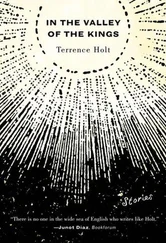“You don’t look like a secretary,” he went on.
“I am a secretary,” she answered.
“But I see you read all those books.”
“That doesn’t mean I’m not a secretary,” she said, and she got up and excused herself to the bathroom.
He was undeterred. The next day he found her outside on the concrete steps in the brief sun that passed between the wisps of fog, her arms goose-pimpled in her cardigan, and he told her she was too good for that office. She had gone to college, he could tell just by looking at her, been raised in a good family. She told him then she wished he would leave her alone. He nodded as if he’d known she would say it. And he did leave her alone after that, a look of melancholy on his face any time their eyes met.
But on her bus ride in the evenings through Chinatown, looking out on the mashed vegetables on the sidewalk and the Chinese rushing for home with their paper bags, only to leave new rotting vegetables on the sidewalk the next day, she thought of Daughtry. Or she remembered her musty dark apartment waiting for her, and she thought, I’ll have a drink with him. Why not? And he told her he would take her away from the city.
So they had gone to Carmel.
In the motel room, sitting on the bed, the hard grooves of his black hair coming undone, still in his leather blazer, Daughtry had cried. “You’re fancy. I wanted to do something fancy for you. But I can’t get back into the checks. I did it this one time, there’s no way they can peg the one on me. But I’m never going back to jail again.” He got up and vomited in the toilet and returned to the bed and now his hair was mopped forward, his nose red and his green eyes sallow. He stretched out on the comforter and began to tell her, although she had not asked, how it was done. She lay next to him, listening as he explained each step of the crime. “You don’t want just any account numbers, you want it from the right mailboxes, in the right zip codes. . It’s like you and the teller are in this dance, and she takes a step and you take a step and as long as you don’t step on her toes, you’re free.”
And she realized as he spoke that the carsickness had gone away. The nausea or ringing or tightness or whatever it was that was back now worse than in the East, had momentarily disappeared. When Daughtry switched to his childhood in the Irish neighborhood with the cramped stucco houses — on and on, about the freeway cutting it up and his drunk mother — she asked him to go back to the checks.
“You like the bad-boy stuff, huh? You like to slum?” She just wanted to understand, she said. “Well, alright, baby. I do happen to have a certain style for these things. .”
She’d listened intently to this man — to whom she was not in truth attracted, whose breath reeked of liquor and vomit, with whom she would spend the night — tell her about money he had stolen to take her to a forgettable dinner in Carmel. And she had felt better.
She had been in San Francisco two years. It was not the weather that had drawn her; she liked the fall leaves and the snow and the humid nights in the East well enough. It was not, as it seemed for the young people who came that spring, with their grass-smoking and greasy hair, the idea of a counterculture, the attraction of some newer, freer community opposing itself to the mainstream; she had no objection to the mainstream. She could not say the exact reason she had come west except that she thought it would help.
What needed helping was hard to pin down. She only knew that it had to do with the carsickness. She could not take walks anymore and she could not be with people, she could not go to the movies or have a drink or visit a museum or read a book without feeling carsick. This was her only term for it. It simulated the thin buzzing nausea of sitting in the backseat of an ever-curving car, except it was not at all related to motion. “Nausea” was not the term either, too clinical and specific. It was not a migraine or a flu. It was the slightest spinning sensation gripping the back of her neck. Like a slow, pitched whine at the outer edge of her skull, behind her eyes, in the joints of her jaw. It was almost imperceptible at first, as if a small humming switch had been left on in her head. But it always grew. It was worst on weekends. The long stretches of free time without occupation — she was relieved to work, to type letters and stuff envelopes at her office jobs, although she did not enjoy it, was not stimulated by it — ineluctable days, no matter sunny or dark, like a dull disc hanging over her, giving off a relentless cardboard light. On the weekends, she tried to divide the days into tenable units. Mornings, to sit with coffee and the newspaper until at least ten o’clock, even if her body buzzed, if her vision blurred with tension. She did not allow herself to clench anything, to go back to bed. If she could make it through newspaper and coffee, she could next turn to some cleaning or tidying task, necessary or not — pulling out every scarf from her dresser and refolding them, for example — until a decent enough time to turn to preparing lunch. Here she made her movements agonizingly slow, scooping out one flaky chunk of tuna at a time, layering in a single spoonful of mayonnaise, dropping single bits of celery and onion, and then repeating the whole exercise over again. When her lunch was ready, she waited with her plate at the table until exactly noon, no sooner. After lunch, anything to keep busy, the walks, a museum if she could bear it — reading never worked at its worst — any activity to stretch the time until mid-afternoon, late afternoon on good days. At that point she could return to her apartment and take a nap or sit by her window watching the light dim. Only then could she reassure herself of the sloping of the day toward evening. Darkness the goal. Darkness to kill the day.
As though forgetting that weekends would still exist there, she had chosen to believe as others in the restorative powers and newness of the West for her own purposes. That a change to the West might help.
And for a while, the new city did help. For the first year, the beauty had awed and distracted her (Boston had been a hill city, too, but the hills were small and heavy and rust-colored in her mind) and she’d been buoyed like everyone else by the pale and white buildings, the fuchsia bougainvillea, the sails on the water and whiffs of orange blossom and jasmine in winter. She’d ridden the cable car to work and eaten crab sandwiches at the wharf, listened to street music in the Italian neighborhood. She had liked to take walks, to spots known for some reputed charm — a robin’s-egg-blue Victorian; a brooding WPA mural; a grove of redwoods in the middle of the park. Once or twice, perhaps, the sight of a young unkempt man with a guitar, the smell of body oil they wore or the absence of handbag and stockings had disturbed the calming effect, had brought on the small buzzing at the back of her skull. But it had not lasted very long.
The first thing to give way had been the buses. She had been accustomed to subways and elevateds in the East, but the main mode of travel around the city was the buses, and on them she could not read a book or write a letter because it made her dizzy, and so she was forced to spend the time looking and thinking. Every morning through Chinatown the painfully thin men wearing second-hand baseball caps for teams they did not follow and the women with their hair cut mannishly short, beautiful cheek bones with missing teeth, and the mounds of vegetables to be bought, and the stands to be dragged into place and filled and haggled over and emptied, and everything to start over the next day. She did not understand why it brought back memories like the prom with the Brylcreemed boy: sitting around with Cokes in her peach-colored satin dress and the gardenias on her wrist and the diamond brooch on her bust. The Brylcreemed boy telling her she was pretty and leading her around the floor and asking her to wear his pin at the next prom. Something in this memory felt like the Chinese and their vegetables. But how could this be anything like the Chinese and their vegetables? She couldn’t puzzle it out. So she tried to observe a sliver of the bay, with its whitecaps and sailboats, or a majestic bridge, or the exotic red calligraphy in the shop windows; but none of it helped. And so she came to hate the buses.
Читать дальше










